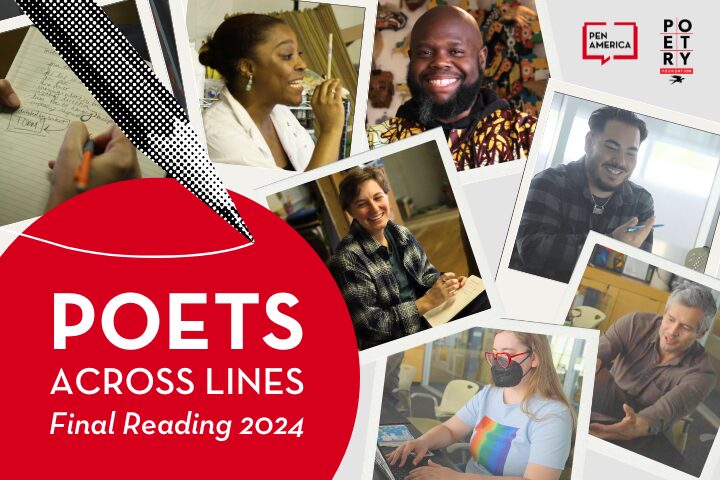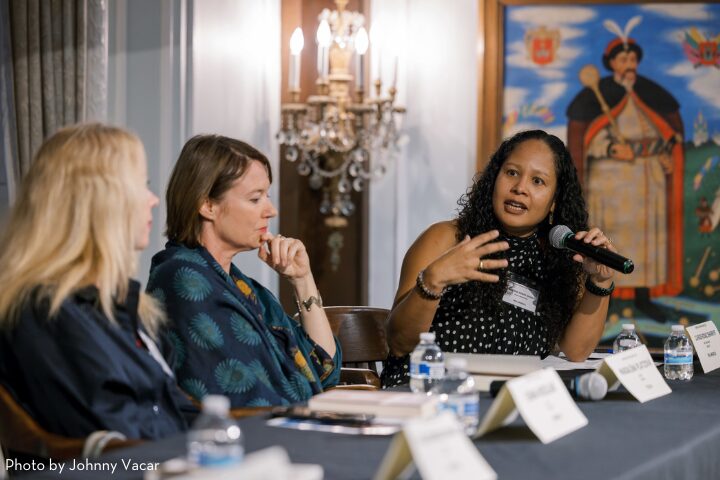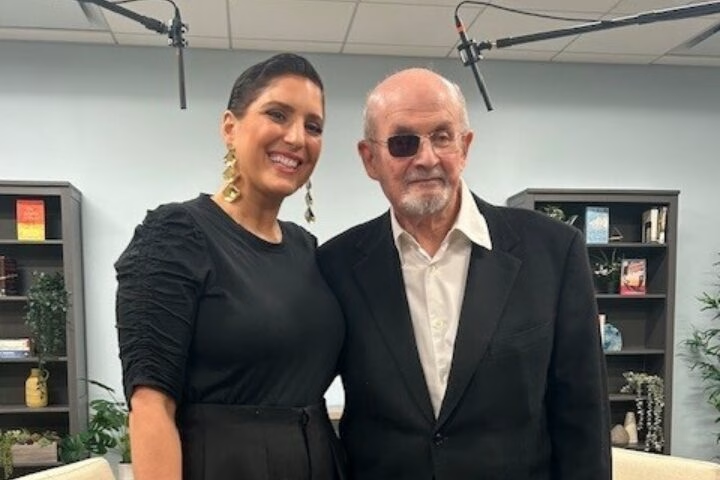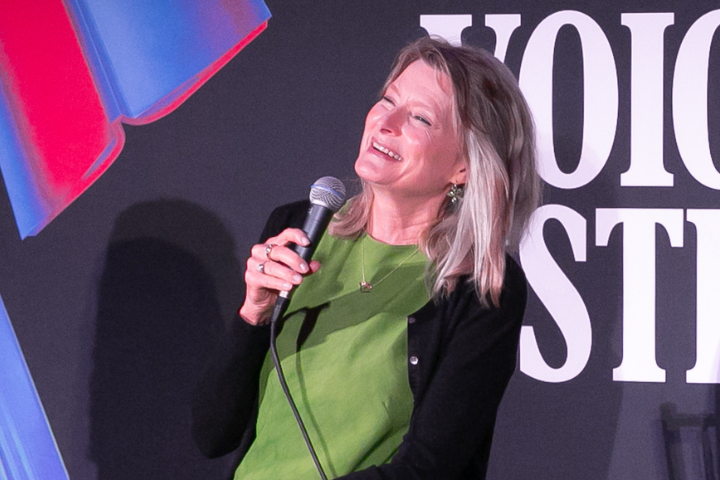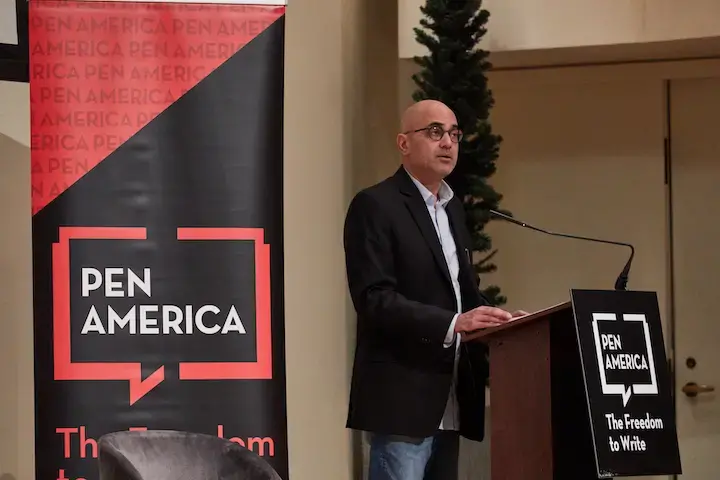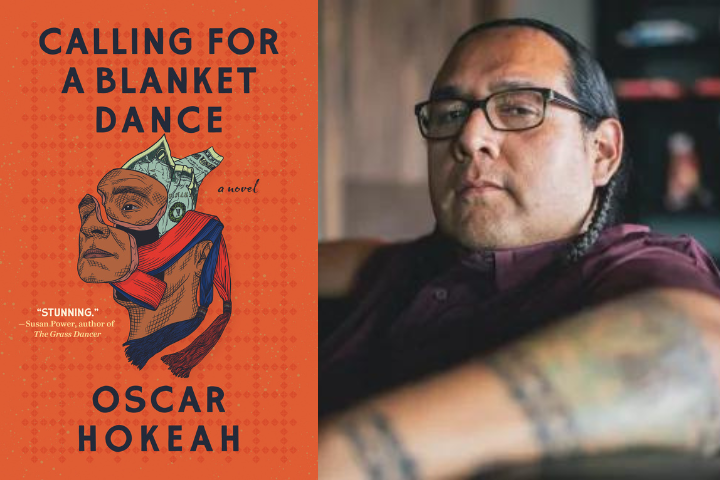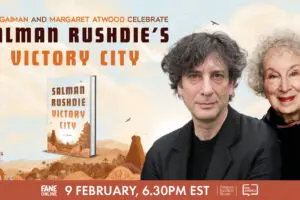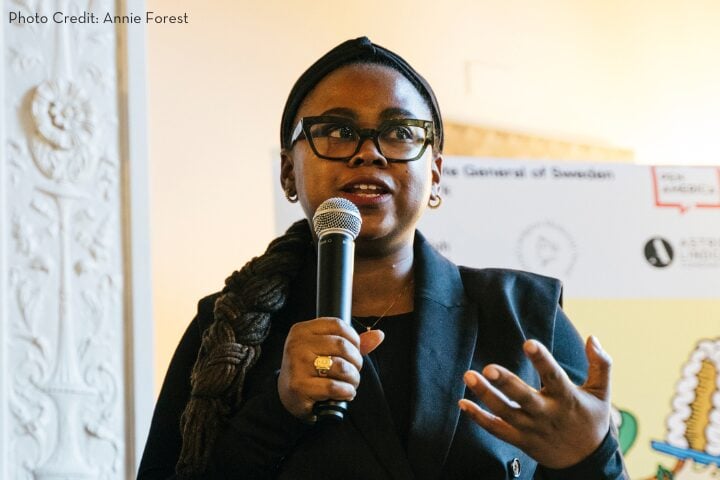
Jamia Wilson grew up a curious child—read everything, asked questions, and wanted a seat at the dinner table talking politics at six. Growing up in Saudi Arabia, she was exposed to global cultures and perspectives, as well as the dark, dangerous side of dissent—speech was censored and books were banned and confiscated at airports. Reading about strong characters like Pippi Longstocking gave her the confidence to celebrate her differences, something she has continued to not only embody but write about to pass on the message to the next generation.
Wilson is now the vice president and executive editor at Random House, and author of This Book Is Feminist, Young, Gifted, and Black, and most recently, Make Good Trouble, among others. At the 80th anniversary celebration of the iconic Astrid Lindgren character at the Swedish Residence in New York, she joined authors and advocates including, Laurie Halse Anderson and PEN America’s Jonathan Friedman, for a panel discussion. We caught up with Wilson to talk about her connection to Pippi, book bans, and what it means to be in publishing today.
What is your relationship to Pippi Longstocking?
For as long as I can remember, I have always loved Pippi Longstocking. Her spirit of independence, her power, her zest and love of adventure. I just loved Pippi because I saw in her the rebel spirit I had as a child, and I loved all of the books and the movies and have been known to still sing the songs that have been in the Pippi movies of my childhood as well.
What makes a children’s book icon like Pippi Longstocking so special?
Pippi is one of a kind. She is iconic because she’s extraordinary, but she’s also a character that we can all see ourselves in. My favorite moments of Pippi are always the moments when Pippi is speaking truth to power, standing up against bullies, refusing to be talked down to, and acknowledging that she has her own power, her own authority, her own dignity and determination. We all know what it means to be underestimated. We all know what it means to be unique in a space that might value sameness. Also Astrid Lindgren and knowing that she was creating this book to show a strong independent spirit of girlhood. That sort of plucky audacity of Pippi really made me think, oh, I can take my rightful place. And if some people don’t get it, that’s on them. I have power. I have contributions to make, no matter how old I am.
What inspired you to start writing?
I loved reading as a child, so that my love of reading really just inspired me to want to write. Although I didn’t have the words for it as a child, that relief I get from writing really comes from a sense that if you are a writer, you’re immoral. Knowing that every book I put out in the world will live longer than I will, if I do my job right, is something that really inspires me. I’m still connecting to so many literary ancestors whose books have really shaped me, who I’ve never met, but they’re my mentors on the page, and so I’m hoping for young people to see that and see themselves through me, just like Pippi’s spirit taught me, ‘Oh, you can be anything you want to be.’ People might underestimate you. You might look different, you might speak differently. You might be a girl who’s told that she’s too much and you are more than enough.
What does it mean to have a platform like yours?
I feel extremely blessed to have a community of people who want to support books that I’m a part of, to meet the voices that I’m amplifying on the page, or the ideas that are sparking my curiosity, and be in conversation or exploration with me. I often ask a lot of the young people who write to me, what would you want to see in the next version of the book, or what did this lead you to think about that you thought that I could have added? Or what is the story that you feel that you would add if you could have a blank page in the book and you would add your own? And that’s what I love about having that kind of platform to be able to engage and have this be a space for learning for me too. I really like to be able to talk to the next generation readers about, okay, what’s the thing I missed now that I’m in my auntie era? What’s the thing you want me to know?
What’s one message you would like to share with young readers?
I would love to share with young readers that you are perfectly imperfect, just as you are. You are more than enough. The world needs your voice, needs your creativity. And I would also like to share the title of my next book, which is not my words, but it’s John Lewis’ words, which is, ‘Make good trouble.’ I would like to tell the next generation that it is always time to make good trouble.
We are here for a character who was created before most of today’s grandparents were born. What does it mean to be a writer and publishing executive today?
I feel really, really fortunate to be able to work on both sides of the desk. What I love about being an editor and an author is that I have an empathy for my authors. I just know what it is to confront that empty page in your brain and your heart and your thoughts and your dreams and your visions and your doubts, and to take that tension and put it on a page and then go and give it to an editor and other people to critique, and go back and forth, and then hand that heart of your story out to the world to also engage with and make it take on a life of its own. And so what I love about working in publishing is really just that connection with the artist to be able to serve them in deep reverence of their art and the vulnerability it takes and the courage and boldness it takes to say, here’s my story, here I’m holding my heart and my hand for you, and you’re going to make it whatever you will. I just love to be in service to that energy and that spirit.
How are book bans affecting the work that you do?
I have been banned multiple times in multiple countries, and I’ve also had books that were challenged, and I always have a real deep sadness about the people who will lose the opportunity to engage with my book or the other books that are banned whether or not they like it. I feel a deep sadness every time a book would be banned, where a human would not be able to expand and deepen their own sense of their truth. I’ve had people write me and say, I completely disagree with what you’ve said about this, and I will say thank you for the honor of having my work help you learn something about yourself, strengthen your own vision, strengthen your own understanding of the world, deepen your deep indignation about whatever I wrote that you didn’t like, and thank you for challenging me and challenging yourself.
Some of the books that I’ve loved the most have been banned books. I grew up in Saudi Arabia as an American, at a time when there was censorship, and there were books that were banned, and I had books confiscated at the airport when I came in and had a really deep and direct experience on what it means to have the government or institutions tell you what you should be reading or what you shouldn’t be reading, and that is another reason why I feel very passionately that we need to confront this, because I have seen what that impact is on society, but then also on readers who may never be able to confront ideas because they don’t have access to those books.
What do you think people can do to combat book bans?
If you have the means to share banned books with your social media, with your dollars to support buying banned books and giving them to Little Free Libraries or to community groups or to donate banned books, do it. If you are someone who can invite an author who’s been banned to speak in your community, and you have a platform to amplify and give a megaphone to those books and those authors, do it. If you are a writer and you have ideas that you have been told are too dangerous because they might wake somebody up to a new vision, write it and speak it. Because there are so many ideas we have now that we think are normal ideas about democracy and justice and love and humanity and how we should connect together. And there were people who paid a price for speaking those ideas at a time when it was fatally dangerous to have those ideas.
You just had a new book come out last month, what was the inspiration behind it?
I was inspired to write Make Good Trouble because Representative John Lewis’ story as a young activist who went on to be a trailblazing social justice leader, visionary global leader, and Congress person, really showed me what it could mean to step into your power and own your purpose young, and then take that into a lifetime of work. And before he passed away, he said a call to action, which was, ‘make good trouble, necessary trouble.’ I wanted to call on the good troublemakers of the world, and by that I mean the people of conscience who want to exist in a world that is expansive and not restrictive, that is open, inclusive, and just. The book chronicles 70 stories throughout history, of youth-led movements. It made me curious about where in the world, across time, from past to present, people started making good trouble and helped us create a better world. I’m hoping that young people will see that and realize that you don’t have to ask for permission at any age to lean into the good and move forward.
What impact do you wish for it to have?
My hope is that this book will inspire people in their local communities to see the things they want to change and take action and make good trouble. What I hope is that people actively engage with this book, that they speak about it, debate about it, that they connect about it, that they look at the date of anniversaries that I list in the back of the book, and find days to plan events, to plan mobilizations. I say in every book that I do, in some way, that I don’t have all the answers, you have answers on your terms, I’m inviting you to engage with these stories and then take what you will and build upon it and make your own good trouble. I wanted young people to see it as a global book of movements. There are many American movements that would not have become the movements that they are, if they hadn’t taken pages from movements in the Global South and other places in the world.

